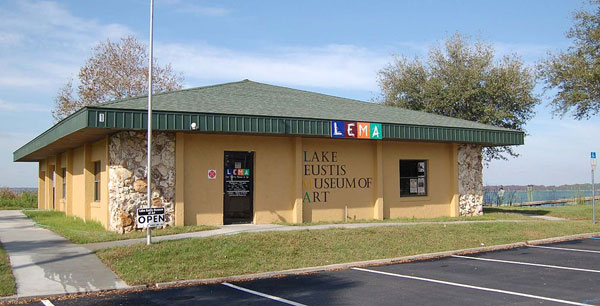
April 12, 2019; Orlando Sentinel
NPQ has too often written about the pain and confusion that come from breakdowns in the relationships between cities and the nonprofit cultural institutions in which they have invested. So we thought we would publish a story with a different kind of outcome…at least so far.
For almost a quarter of a century, Lake Eustis Museum of Art (LEMA) has been bringing fine art exhibitions and art classes to central Florida’s Lake County. That’s about to end. Recently, LEMA’s board voted to move the museum to Tavares, five miles south of the Eustis. It’s just “not feeling the love” in Eustis.
LEMA opened at 113 Bay Street in 1995, then later moved to a building at Orange Avenue and Grove Street before relocating to the current location in 2012. While the museum is largely supported by membership dues, sponsorships, and donations, it relies heavily on state funding. Financial constraints, including the loss of the state cultural affairs grant it used to pay staff salaries, has left the museum in dire straits, with dwindling financial resources and a Eustis city-owned building in serious need of repair.
The museum’s board went to the city for help, but the 14-month negotiations fell through. “We’ve been struggling financially for a long time,” Lou Buigas, chairwoman of the board of directors, claims. “We’re not feeling the love, so we’ve got to go where we feel the love.”
Eustis City Manager Ron Neibert sees things differently. He says, “Obviously if the city didn’t ‘feel love,’ we wouldn’t have let the museum stay in the 2,300-square-foot building rent-free for nine months.” He notes that the $1,300 monthly rent is below market rate, and goes on to say, “I don’t know if it was a lack of what we did or didn’t do. I just feel that they had a better opportunity at a better location.”
City officials are sending the museum off with good wishes. Commissioner Karen LeHeup Smith, who has served on the museum’s board and more recently as the city liaison to the museum, is optimistic about the transition.
“It’s a positive move for the museum; it’s a positive move for Lake County,” she says. “There were some difficulties but with this step they’ve created a way to work through those difficulties.”
Sign up for our free newsletters
Subscribe to NPQ's newsletters to have our top stories delivered directly to your inbox.
By signing up, you agree to our privacy policy and terms of use, and to receive messages from NPQ and our partners.
Thanks to a generous commitment from the Herbert Lehner Charitable Trusts, the relocated museum will occupy 1,692 square feet in the lobby of one of Lehner’s three Key West Resort hotels at 213 W. Ruby Street. Lehner, a Fort Lauderdale businessman, said Friday that he wanted his gifts to be permanent.
“I set up a charitable trust and put the hotels in a trust,” he said. “If I die, it just keeps on going.”
The Lehner trusts were created about three years ago to distribute the “profits” from the three hotels. Among other donations to official charities are scholarships for students graduating from Tavares High School.
Tavares is thrilled. According to Tamara Rogers, the city’s Director of Community Services and Parks & Recreation, “I can tell you that we are deliriously happy. It is the first program of its kind for us in the city. We see them fitting in with many things we do like being part of our summer camps and engaging with our library staff to bring in additional programming for our children and teens and even our adults and seniors.”
LEMA shares Lehner’s commitment to education. D.J. Varon, Henry Lehner’s Charitable Trusts administrator, says, “They showed us what they’ve done, what they are doing currently and what their vision is for permanent and traveling exhibits, for camps they want to bring to our community and workshops they want to offer children and adults. The arts are kind of lost in school, so we thought it would be a good addition to the foundation of the city.” The museum will have to pay rent, but the details have not been disclosed.
Buigas calls the impending move a “rebirth” for the museum, not to mention a new name. She says, “We want to be a big part of the community and have the community be a big part of us and I think we will be in a location where people will embrace and engage in and with the arts.”
That is what it’s all about for small community art museums in the US. What is possible with and through them? What would we do without them? Both Tavares and Eustis are about to find out.—Meredith Betz













